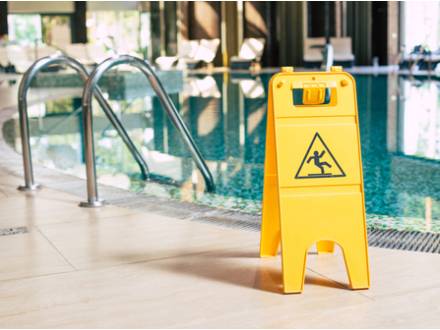Follow Us |Facebook
Call or Text for a Consultation
Who Is Liable for a Swimming Pool Injury in Illinois?
 Not all swimming pool injuries are the result of someone else’s negligence. However, if you or a loved one has been injured in a pool accident, you might have a valid personal injury claim for compensation. Under Illinois law, the pool owner could be liable. An experienced Orland Park, IL premises liability attorney can help you determine whether you have a valid claim and pursue compensation for your injuries.
Not all swimming pool injuries are the result of someone else’s negligence. However, if you or a loved one has been injured in a pool accident, you might have a valid personal injury claim for compensation. Under Illinois law, the pool owner could be liable. An experienced Orland Park, IL premises liability attorney can help you determine whether you have a valid claim and pursue compensation for your injuries.
Applying Premises Liability Law To Swimming Pool Accidents in Illinois
When a swimming pool accident occurs, premises liability law determines whether the property owner or another responsible party can be held accountable. Under the Illinois Premises Liability Act, property owners must exercise reasonable care to protect people from foreseeable dangers, including unsafe conditions around swimming pools. If they fail to correct hazards or warn visitors about the danger, the owner may be liable for resulting injuries. For example, if a hotel leaves a broken pool light unrepaired and a guest is injured due to poor visibility, the hotel could be held responsible.
Special rules apply when children are involved. Pools are considered an "attractive nuisance," meaning they naturally draw children who may not recognize the risks. Even if a child enters the property without permission, the owner may still be liable if the pool was not properly secured.
Liability can also extend beyond the property owner. A homeowners' association, management company, or maintenance contractor could share responsibility if their negligence contributed to the unsafe conditions. When you work with an experienced attorney, they will investigate the circumstances that led to your injuries and figure out who to hold accountable.
Understanding Swimming Pool Laws in Illinois
Illinois has specific rules governing swimming pools, especially when it comes to safety. Under the Illinois Swimming Facility Act, public pool operators are required to maintain sanitary and safe conditions. This includes proper filtration systems, fencing, and safety equipment. Additionally, under Illinois Department of Public Health regulations under 77 Ill. Adm. Code 820, the law provides detailed standards for the design, operation, and maintenance of pools that are open to the public. These standards are meant to reduce drowning risks, prevent chemical hazards, and ensure safe access to swimming facilities.
For residential pools, local building codes often require secure fencing with self-latching gates. Failure to comply with laws that regulate pools can be an indicator of liability.
Common Causes of Swimming Pool Accidents in Illinois
Some of the most common causes of pool injuries in public and private pools include:
-
Lack of supervision: Drownings and near-drownings often occur when children are left unattended.
-
Defective equipment: Malfunctioning ladders, diving boards, or drains can create dangerous conditions.
-
Slippery surfaces: Poorly maintained decks and walkways can lead to serious slip and fall accidents.
-
Improper fencing or barriers: As previously mentioned, residential pools must have a fence and gate to prevent unsupervised access.
-
Chemical hazards: Excessive chlorine or improper storage of cleaning products can result in burns, rashes, or respiratory injuries.
Each of these causes may point to liability on the part of a property owner, manager, or even a third-party contractor responsible for pool maintenance.
Schedule a Free Consultation with an Orland Park, IL Premises Liability Attorney
If you or a family member has suffered a swimming pool injury, an Orland Park, IL premises liability lawyer can help. At Issa Law, LLC, we can offer extensive trial experience, having handled pre-trial motions, constitutional challenges, bench trials, and jury trials in both criminal defense and personal injury cases. We bring that same level of dedication and courtroom skill to every client.
The firm also represents personal injury clients on a contingency-fee basis, meaning you will not owe attorney’s fees unless we secure compensation for you. Take the first step toward compensation and call 708-966-2408 today to schedule a free consultation.




